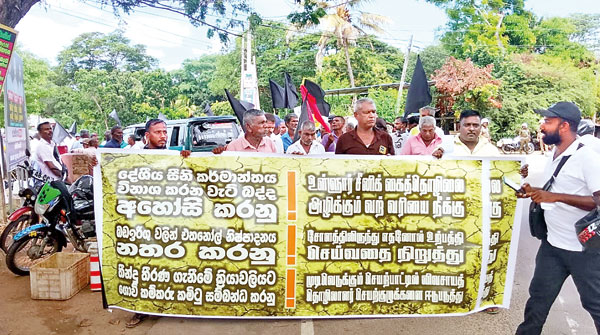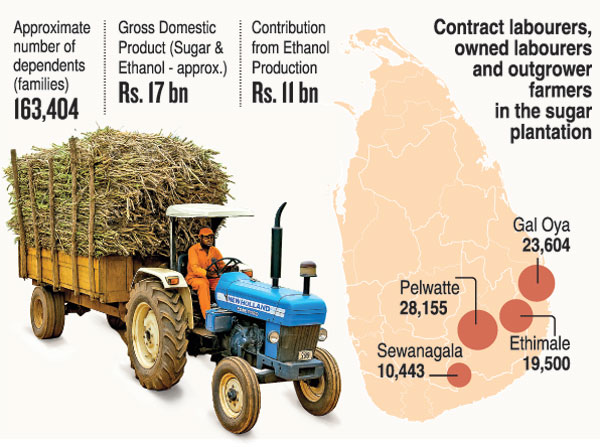News
Sugar factory overhaul continues alongside farmer payments delays
View(s):By Ishu Bandara
Despite the crushing impact on the lives of farmers, workers, and others who depend on the Lanka Sugar Company (Private) Limited, the government is reportedly asking them to endure another month before a solution is provided for their concerns.
The Lanka Sugar Company manages two key units: Pelwatte in Buttala, Monaragala, and Sevanagala. Both units engage in sugar manufacturing, ethanol production, power generation from bagasse, and bio-composting. However, for years, these units have faced heavy financial losses, and the sugar and ethanol sector continues to struggle.
Recently, workers from Pelwatte and Sevanagala protested to raise awareness about their grievances.

Pelwatte sugarcane suppliers protest in Buththala Pix by Sumanasiri Gunathilaka
On July 30, concerns of sabotage arose when a 170 boulder was found hidden in a sugarcane stock at the Sevanagala Factory. Deputy Minister of Trade, Commerce, and Food Security R.M. Jayawardena, during a factory visit on August 1, assured the government would not allow sabotage and pledged protection for workers and stable sugar prices. Police investigations are ongoing.
Sugarcane farmer Mr Suresh from Sevanagala told the Sunday Times that farmers have not received payments for cane cutters or transporters and are under severe financial pressure. Some, he said, had to pawn their jewellery to pay workers. “We are still harvesting April to May crops. June to July remains untouched. There’s a big backlog,” he said. He also raised the issue of VAT, saying that although the minister had claimed billions were allocated, the funds were only released a day before protests, seemingly to suppress them.
According to information obtained by the Sunday Times, Lanka Sugar Company, a 100% state-owned entity, had recorded strong profits from 2019 to 2022, with brown sugar fetching over Rs. 300 per kg and ethanol at Rs. 1,500 per litre during the pandemic. Despite this temporary boost, those profits did not lead to sustainable improvements.

Repeated attempts by the Sunday Times to reach Minister of Industry and Entrepreneurship Development Sunil Hadunnetti were unsuccessful.
When the Sunday Times asked about unpaid dues, Kasun Gamage, media secretary to the Minister of Industry and Entrepreneurship Development, acknowledged a delay of only about 10 days.
He clarified that “all the advance payments have already been made” and that payments are usually processed in phases. Mr. Gamage also noted that the “amount is large because the number of workers is high’’.
Furthermore, he stated that they had agreed to a slight further delay in transport payments. He added that the issue was later “exposed to the media as a big picture.”
A significant demand from the industry is the removal of VAT on sugar and ethanol. However, Media Secretary Kasun Gamage said that the government does not intend to reduce the VAT, as it could affect other sectors. He also confirmed that sugar price will not be reduced.

Sri Lanka’s sugar industry is vital to the economy, directly supporting over 81,000 workers and 163,000 dependents. It contributes an estimated Rs. 28 billion annually to the economy, with Rs. 17b from sugar and ethanol and Rs. 11b from ethanol alone. Experts argue that VAT removal and urgent reforms are needed for sustainability.
Trade union leader Nihal Attanayake told the Sunday Times that EPF issues remain unresolved, with retired workers unable to access their savings. He estimated Rs. 8 billion is needed to resolve matters at Pelwatte alone. He said crushing continues until October 20, with over 500,000 tons still to process, but fuel shortages are hindering progress. “We owe filling stations money and need diesel for water motors,” he said.
Mr Attanayake also criticised sugar imports, claiming it is done without assessing local stock. He emphasised ethanol as the industry’s main profit stream and urged the government to remove VAT on sugar and ethanol, stop ethanol imports, and improve infrastructure. He called on President Anura Kumara Dissanayake to personally intervene.
In response to questions from the Sunday Times, Lanka Sugar Company Chairperson Sandamali Chandrasekara confirmed that Pelwatte Sugar Industries now operates under Lanka Sugar Company, taken over through the 2011 Revival of Underperforming Enterprises Act.
She said the management is working to stabilise finances and ensure timely salary and EPF payments through improved coordination with the Treasury.
She acknowledged that under previous administrations, both Pelwatte and Sevanagala had been politically managed instead of commercially, which led to long-term viability issues. The current management aims to establish them as professional, state-run enterprises with no privatisation plans. On sugar pricing, she emphasised that lowering prices below production cost would harm local producers.
She noted that ethanol imports have been banned since 2020 to support local production using molasses. Still, the imposition of VAT and inadequate investment, along with cheaper white sugar imports and global price declines, have strained the company’s finances. The focus now is on operational efficiency, financial stability, and strategic investment to restore profitability.

Given ethanol’s profitability as a by-product, industry insiders say more attention should be directed to its production. Former Pelwatte CEO Nuwan Dharmaratne told the Sunday Times that the government must consider ethanol’s importance in the sugar industry’s revival. He stressed that any VAT removal must benefit consumers directly to have a meaningful effect.
Mr Dharmaratne raised concerns about corn supply, pointing out that despite government imports, local stocks remain unused while a new harvest nears. If those stocks are diverted to ethanol production instead of animal feed, he warned, the sugar industry may suffer again.
Sri Lanka consumes about 4.5 million metric tons of corn annually, with 2.65 million MT produced locally. However, most domestic corn is of poor quality due to Aflatoxin contamination, making it unfit for Thriposha or dairy cattle feed, as it affects milk quality. As a result, this corn is often used for ethanol, which he argued is a short-sighted practice.
He called for a national post-harvest plan to improve corn quality through moisture control and proper storage. “We don’t lack quantity, we lack quality,” he said, urging the government to prioritise better use of corn for food and feed rather than ethanol, to protect the agricultural economy.
The best way to say that you found the home of your dreams is by finding it on Hitad.lk. We have listings for apartments for sale or rent in Sri Lanka, no matter what locale you're looking for! Whether you live in Colombo, Galle, Kandy, Matara, Jaffna and more - we've got them all!

